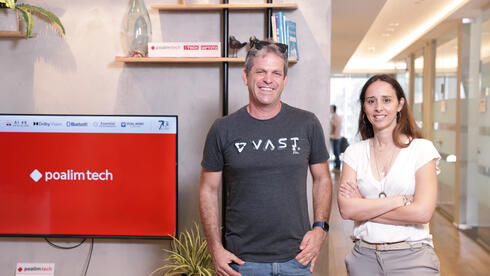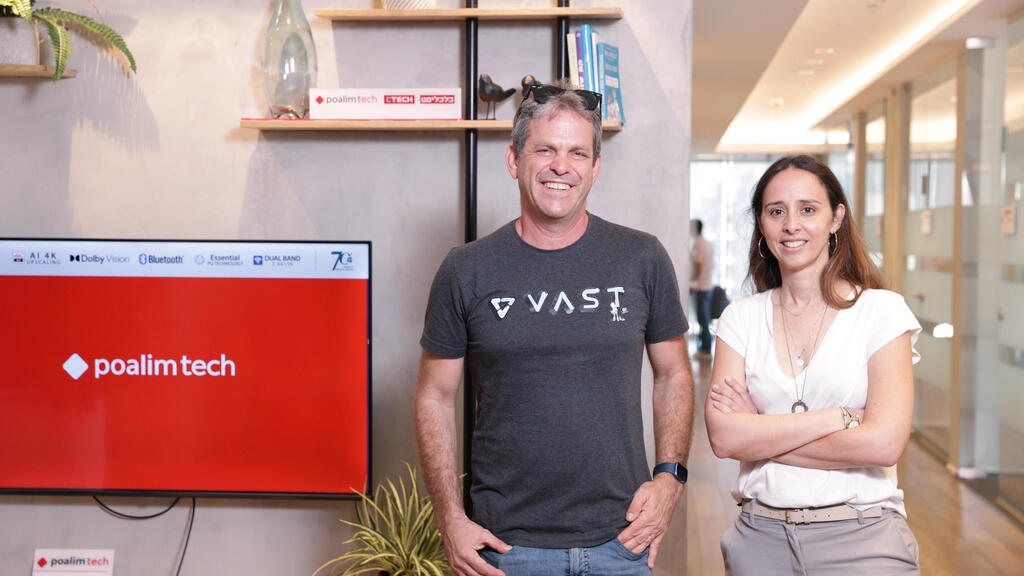
"A startup is like a roller coaster and the trick is to know how to grow from the ride"
Shachar Fienblit from VAST Data and Caroline Meidan from BonData spoke at a Growth+ mentoring meeting organized by Calcalist and Poalim Tech about leveraging data and pricing products effectively.
Shachar Fienblit, co-founder of VAST Data, which develops storage solutions for training AI models, recently met with Caroline Meidan, CEO of BonData, which develops a platform for generating business insights from data in the company's systems.
The conversation was held as part of the Growth+ project, involving a series of 1:1 meetings between experienced entrepreneurs and early-stage start-up companies, with the goal of providing advice, support, and knowledge on entrepreneurship, creativity, managing start-ups, and building companies for growth.
Shachar, tell us about a crisis you encountered at the beginning of your journey and what you learned from it that can help young entrepreneurs.
"A startup is like a roller coaster; there are many such moments, and the trick is to know how to grow from the ride. We are a very successful company, but there are many ups and downs. In the end, the real difficulty is getting people to buy the product. Every sales process involves many business and technological challenges. In crises, things don't always get resolved right away, but it's an opportunity to see what the company is capable of."
Caroline, what is the biggest difficulty you have encountered in the past year?
"We are a pair of entrepreneurs, and we wanted to ensure our partnership worked well while assessing the feasibility of our product. The plan was to start fundraising on October 8th and kick off the startup that way, but we all know what happened on October 7th. Instead of meeting our schedule goals, we volunteered at the expo to help find missing persons. The company is supposed to continue functioning, but we don't know how this difficult reality will affect us or what needs to be done to succeed in this venture. The state of the economy in Israel makes you want to be a part of driving it, and you need to find the mental strength to move forward at this stage. Many questions arose: when to invest, who would want to invest, and whether to continue giving it our all or pause. When you truly believe in what you're doing and its groundbreaking potential, the partners help each other."
Shachar, what advice did you give Caroline?
"We mainly talked about the product, how to sell it, and to whom. Every product is something you learn about along the way. If you build a product that already has a thousand similar ones on the market, it's clear whom to sell to. But when you build a new product, you must talk to various people in the organization to identify the right person to sell to. Sometimes it's the people who understand the problem best, others have the budget, and sometimes you need to sell to multiple parties. At VAST Data, we have projects that we sell to several parties within an organization. It also depends on the size of the organization; larger organizations require broader consensus."
What did you learn from each other? Is there anything you will take with you moving forward?
Shachar: "Some of the problems they are trying to solve are issues we at VAST Data also face. It relates to growing companies, dealing with multiple systems, and managing them all."
Caroline: "There are quite a few things I take with me. Firstly, we share the world of data. There are many overlapping aspects, especially in how we look at and handle data. Shachar provided several tips that can push us forward. Secondly, which is very important for a startup, we discussed pricing strategies, and he gave me a priceless tip that will help us progress."
Tell us something interesting or surprising you discovered about each other today.
Caroline: "I learned that there is a settlement called Ein Ayala near Habonim Beach, where Shachar lives."
Shachar: "I learned that Caroline carries a weapon for protection."
Michal Kissos Hertzog, CEO of Poalim Tech, concluded: “In my conversations with entrepreneurs, we talk a lot about how to build a relatively easy solution so that you can prove that your idea is really necessary. That is, how do I get 90% of the benefit with 10% of the work. Too often entrepreneurs spend too much time developing their idea, before they can prove it is necessary. That is why it is important to build the solution gradually, incrementally. We saw this importance also in the stories of the more mature and experienced entrepreneurs in this project."















